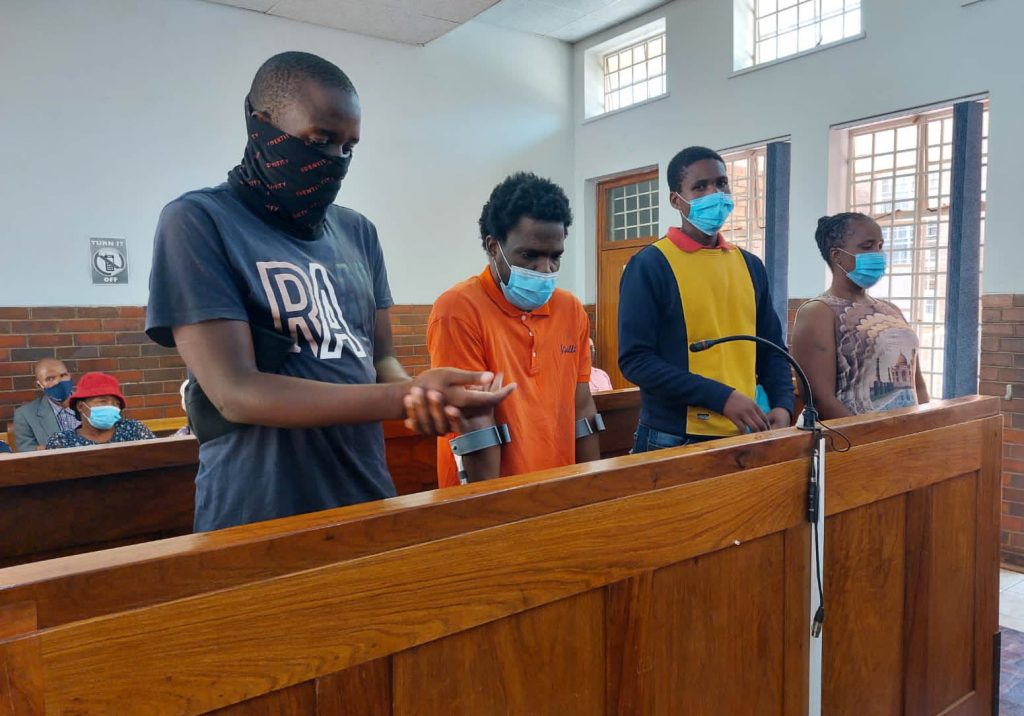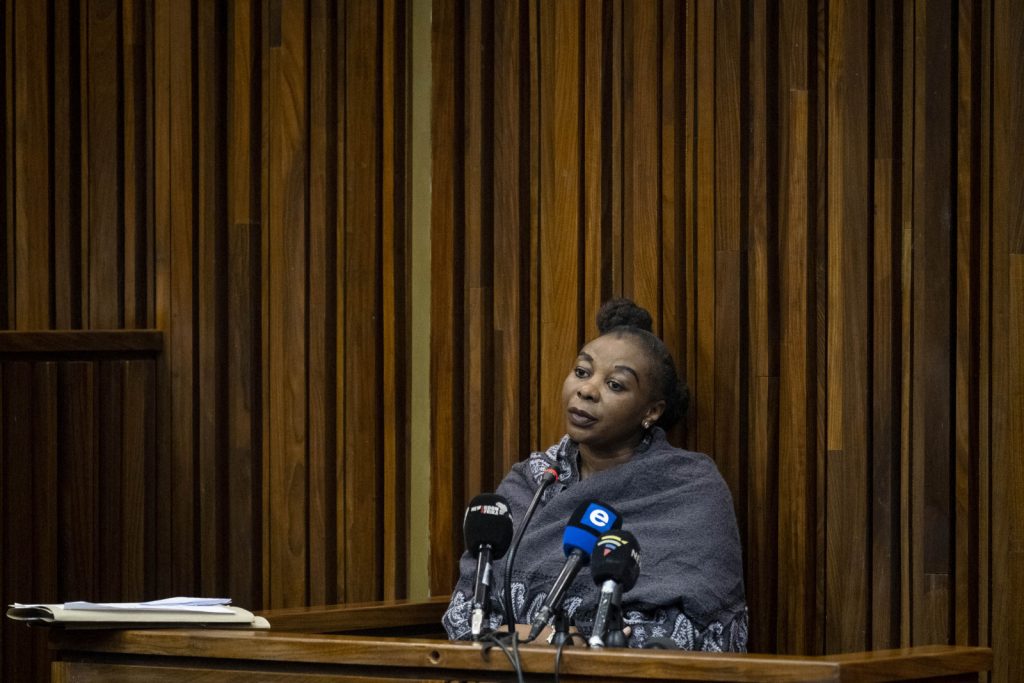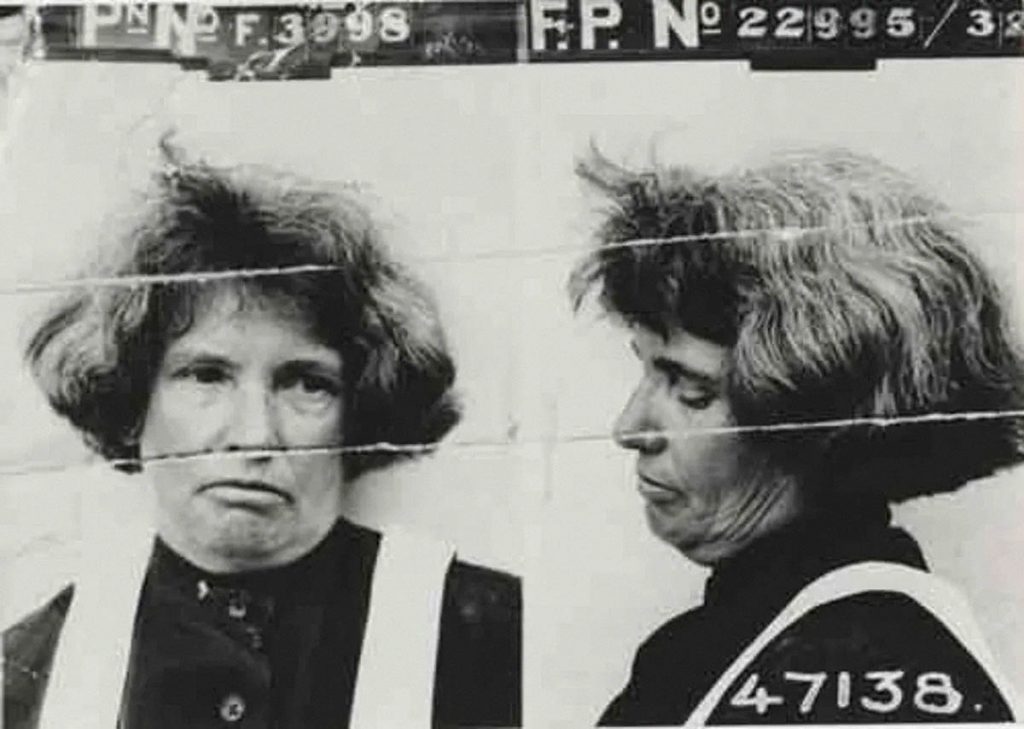Female killers usually do so for three reasons – psychopathy, greed and because they’re abused – but there is gender bias even in murder. (Photo by OJ Koloti/Gallo Images via Getty Images)
Mogokolodi Digama’s life was snuffed out one fateful night at a spaza shop on his way home from work. Gunmen attacked and killed Digama, a warrant officer in the police force, and then drove off in his vehicle, which was later found burnt out in Madibong village in the Sekhukhune district in Limpopo, in June 2021.
 Maesela and a man – apparently her boyfriend – and
charged them with Digama’s murder along with alleged hitmen, Mpusheng
Titos Malata and Nosky Mabitla
Maesela and a man – apparently her boyfriend – and
charged them with Digama’s murder along with alleged hitmen, Mpusheng
Titos Malata and Nosky MabitlaFor days, Digama’s family consoled his widow, Tubake Maesela, whom they called “Mumsie”. Digama’s mother, a widow herself, was particularly comforting.
But then the police arrested Maesela and a man, apparently her boyfriend, and charged them with Digama’s murder, along with alleged hitmen Mpusheng Titos Malata and Nosky Mabitla.
The trauma experienced by Digama’s family was magnified and their nightmare of attempting to unravel the truth had started.
“We felt like we were hearing about the passing of my uncle for the first time. We were very disappointed and shocked. It wasn’t easy. Even now, we can’t believe it because we had been feeling very sorry for her. She had just lost her mother and three weeks later she lost her husband,” said Digama’s niece, Mathapelo Matsaung, who is also the family spokesperson.
“My granny felt very sorry for her because she had lost her husband a long time ago so she knows the feeling. I don’t think she will ever forgive her. She is in pain.”
Mathapelo Matsaung
Matsaung said Digama had introduced her to Maesela in 2003. The couple later had three children and eventually married in 2019.
Maesela has opposed the family’s legal application to prevent her from inheriting Digama’s pension money as well as their application to exhume his body to run DNA tests. The family suspects that Digama may not have fathered the couple’s three children.
Maesela is, of course, innocent until proven guilty beyond a reasonable doubt in a court of law and her case is pending in Sekhukhune magistrate’s court.
Her high-profile murder trial brings into focus recent cases where South African women have been arrested, tried and found guilty of murder.
Probably one of the most shocking cases in recent months is that of former Gauteng policewoman Rosemary Ndlovu, who was sentenced in November 2021 to six life terms for murdering her partner, Maurice Mabasa, her cousin, Madala Witness Homu, nephews Brilliant Mashego and Mayeni Mashaba, sister Audrey Ndlovu and her niece, Zanele Motha.
 Rosemary Ndlovu, who was sentenced in November 2021 to six life terms for murdering her partner.
Rosemary Ndlovu, who was sentenced in November 2021 to six life terms for murdering her partner.Her motive was financial; she had taken out insurance policies totalling R1.4-million on behalf of her victims.
There is also the case of Laura Dickason, the Pretoria doctor, charged in New Zealand for the murders of her twin daughters, Maya and Karla, 2, and their older sister Liane, 6, whose father found them dead in their home in September 2021. Dickason made her first court appearance in September 2021 and was referred to hospital for psychiatric evaluation. Her defence attorney and the state are arranging independent psychiatric reports before the trial, which has been set down for March 2023.
Psychopathy, greed, battery: these are the top three categories in which our society, and psychology, place women who kill, seizing the opportunity, as one psychologist said, to “gender” bias even the act of murder when it is perpetrated by women.
Sherianne Kramer, a research psychologist with the University of the Witwatersrand and a consultant to the World Health Organisation, said categorising criminal minds was not fruitful, although it has uses for sentence structuring and rehabilitation.
Kramer said that in a group of 20 female sex offenders that she had worked with, each had their own reasons for their crime.
“There were no similar reasons for doing the crime. Some purely had mental health issues, some really believed a man’s sperm could cure them of specific diseases so they hijacked truck drivers, tied them up and raped them. [S]ome women had sexually violated children and were selling pornography as a means to an end, and for others it was anger over what had been done to their own bodies.”
Kramer said she had worked with young women killers in South African prisons, including interviewing 115 women in Pollsmoor Prison in Cape Town, and found that some murders stemmed from gang initiations while other women were coerced into killing.
“There are three types of female criminals, broadly: one is male-coerced, the second is severely mentally ill and/or a drug abuser or has a history of their own abuse and victimisation, and the third is generally more in the sex category type — [she uses] the idea that women are harmless and she uses those traits to engage her victim. It’s a case of ‘I was in love with this woman and she was kind’.
“But these categories rely on gender norms and render this idea that a woman can’t kill, that she was forced by a man, she was victimised, she was on drugs. There is very little accountability, but when you look at men there is accountability. These categories turn women into the victims,” she said.
Although she “vehemently” endorses women’s rights, Kramer said it was unfair to always make women out to be the victims and men the perpetrators.
“We should also be a little more open to the fact they are capacitated and empowered to commit violence. It would be very strange if women were operating outside this web of violence in our society,” she said.
“Gendering it is problematic and it is the same with men. There are serial killers and there are patterns, and there are killers and no patterns, and then there are children with conduct disorders who set dogs’ tails alight,” she said.
She also believes the justice system is easier on women than men, doling out lighter sentences for the former.
Professor Gertie Pretorius, a counselling and research psychologist who has worked in the field for 40 years, said her studies showed different categories of women killers. She has conducted 936 interviews with women in South African prisons and says their stories are similar — they got desperate and killed to escape the cycle of domestic abuse.
“There are women who kill their abusive partners in desperation. They have been everywhere — to the police, religious leaders, their families, social welfare; they have got protection orders. They are told, ‘Go back and be a good wife,’ and when they have absolutely no choice left, they will kill in desperation,” Pretorius said.
“If they were men they would have been able to use the self-defence argument, but because they are women they have to be branded as pathological and sufferers of battered woman syndrome. But that is a very patriarchal view.”
Pretorius said there was the category of women who hired hitmen to kill and there were those who did the killing themselves.
The differentiating factors are the level of education and financial means.
“Women very seldom use firearms. In South Africa, women often use fire, poison, knives and forks and whatever they have at their disposal.”
 Daisy de Melkers
Daisy de Melkers“Then,” Pretorius concedes, “there are women who kill their children and family and there are the Daisy de Melkers, who kill for greed, the latest case of the former policewoman [Ndlovu] who killed six people to get insurance money, is a typical example.”
According to the department of correctional services’ latest statistics, there are 143 778 inmates in the country’s prisons, of which just 2.63% or 3 785 are women, both sentenced and awaiting trial.
Of these women, 792 are serving sentences for murder in Gauteng and KwaZulu-Natal, which have the most women in this category.
Now, as Maesela awaits the start of her murder trial on 19 August, Digama’s family is left with unanswered questions as they face the emptiness without him.
“She was a very quiet person … even if there was a ceremony at home she would just be quiet and stay in the room. He trusted her so much. They were still in love but there was no happiness. My uncle was not happy. I don’t know what made him stay in the relationship,” Matsaung said.
“He told me the week before he married her that he wanted to leave everything. He wanted to cancel the wedding and I told him maybe he was just nervous. We are disappointed about the arrest of Mumsie. We just don’t know what to say.”
[/membership]